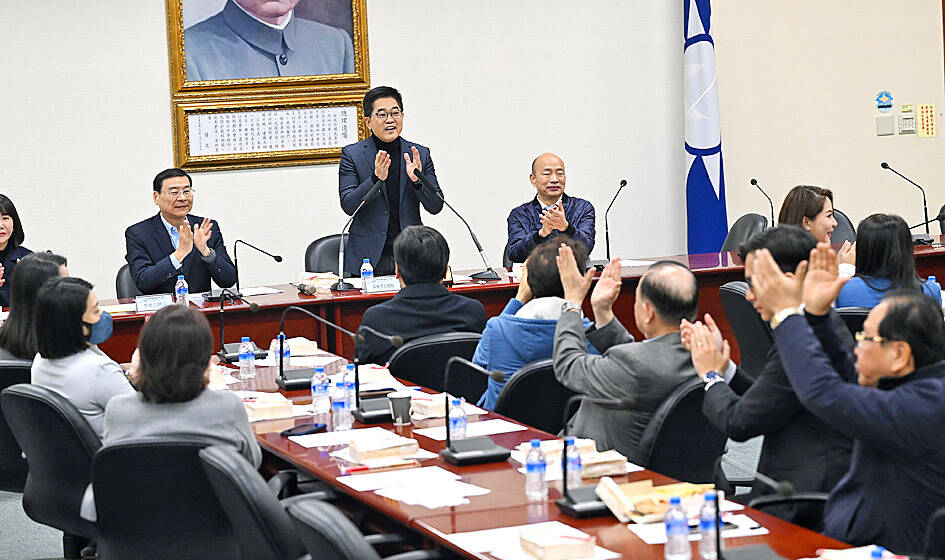The Chinese Nationalist Party (KMT) caucus yesterday pledged to reinstate the special investigation division of the Supreme Prosecutors’ Office and strictly oversee the government’s implementation of the death penalty as part of judicial reforms it plans to introduce in the new legislative session, which starts tomorrow.
Incoming KMT legislator-at-large Wu Tsung-hsien (吳宗憲), formerly a prosecutor and New Taipei City legal affairs bureau director, said the caucus would continue to push for the reinstatement of the special investigation division despite opposition from the Democratic Progressive Party and the Taiwan People’s Party.
“My idea is simple: Treat good people better and treat bad people worse. Prosecutors have been so burdened by their workload they do not have time to handle major cases in the same way the nation did when it had the special investigation division,” Wu told a news conference at the KMT’s headquarters in Taipei.

Photo: Chang Chia-ming, Taipei Times
The KMT caucus would also propose that a cap on prison sentences be extended from 15 years to 25 years, and that additional jail time for specific aggravated offenses be raised from 20 years to 30 years, he said.
The government should give judges the option to mete out life sentences without parole, and establish stricter criteria to scrutinize parole applications from inmates or requests to serve their sentences in minimum-security prisons, he said.
Wu said that he would closely monitor the Ministry of Justice’s implementation of death penalties.
The ministry has not enforced the Regulations for Executing the Death Penalty (死刑執行規則) for a long time, which is a clear case of the executive branch intervening in the judicial branch, he said.
The KMT caucus would address rising incidents of fraud, and gun and drug trafficking in the draft technology investigation act (科技偵查法) and seek separate sentences for manufacturing, transporting and selling drugs, he said.
The caucus would also propose amendments to the Cultural Heritage Preservation Act (文化資產保存法), Culture and the Arts Reward and Promotion Act (文化藝術獎助及促進條例), Development of the Cultural and Creative Industries Act (文化創意產業發展法) and the Cultural Fundamental Act (文化基本法) to better preserve cultural assets, increase funding for cultural development and relax regulations on corporate sponsorships in cultural and creative industries, incoming KMT legislator-at-large Lin Chien-chi (林倩綺) said.
The caucus previously proposed introducing absentee ballots, amendments to the Budget Act (預算法) and postponing the retirement of the Jinshan, Guosheng and Ma-anshan nuclear power plants.
Meanwhile, the KMT yesterday elected legislator-elect Fu Kun-chi (傅?萁) as its new caucus whip and Legislator Hung Meng-kai (洪孟楷) as the caucus’ new secretary-general.
Fu’s first task as the caucus whip is to ensure that incoming KMT legislator-at-large Han Kuo-yu (韓國瑜) and Legislator Johnny Chiang (江啟臣) would be elected legislative speaker and deputy speaker respectively at the start of the new legislative session.
Legislators who skip the vote, vote for other candidates or vote incorrectly would be subject to the strictest party discipline, Fu said.
“All KMT legislators are united and have clearly indicated that they would support Han and Chiang,” he said.
“All legislators must be present and cast their votes. Those who fail to do so would receive the strictest discipline from the party,” he added.

An essay competition jointly organized by a local writing society and a publisher affiliated with the Chinese Communist Party (CCP) might have contravened the Act Governing Relations Between the People of the Taiwan Area and the Mainland Area (臺灣地區與大陸地區人民關係條例), the Mainland Affairs Council (MAC) said on Thursday. “In this case, the partner organization is clearly an agency under the CCP’s Fujian Provincial Committee,” MAC Deputy Minister and spokesperson Liang Wen-chieh (梁文傑) said at a news briefing in Taipei. “It also involves bringing Taiwanese students to China with all-expenses-paid arrangements to attend award ceremonies and camps,” Liang said. Those two “characteristics” are typically sufficient

A magnitude 5.9 earthquake that struck about 33km off the coast of Hualien City was the "main shock" in a series of quakes in the area, with aftershocks expected over the next three days, the Central Weather Administration (CWA) said yesterday. Prior to the magnitude 5.9 quake shaking most of Taiwan at 6:53pm yesterday, six other earthquakes stronger than a magnitude of 4, starting with a magnitude 5.5 quake at 6:09pm, occurred in the area. CWA Seismological Center Director Wu Chien-fu (吳健富) confirmed that the quakes were all part of the same series and that the magnitude 5.5 temblor was

The brilliant blue waters, thick foliage and bucolic atmosphere on this seemingly idyllic archipelago deep in the Pacific Ocean belie the key role it now plays in a titanic geopolitical struggle. Palau is again on the front line as China, and the US and its allies prepare their forces in an intensifying contest for control over the Asia-Pacific region. The democratic nation of just 17,000 people hosts US-controlled airstrips and soon-to-be-completed radar installations that the US military describes as “critical” to monitoring vast swathes of water and airspace. It is also a key piece of the second island chain, a string of

The Central Weather Administration has issued a heat alert for southeastern Taiwan, warning of temperatures as high as 36°C today, while alerting some coastal areas of strong winds later in the day. Kaohsiung’s Neimen District (內門) and Pingtung County’s Neipu Township (內埔) are under an orange heat alert, which warns of temperatures as high as 36°C for three consecutive days, the CWA said, citing southwest winds. The heat would also extend to Tainan’s Nansi (楠西) and Yujing (玉井) districts, as well as Pingtung’s Gaoshu (高樹), Yanpu (鹽埔) and Majia (瑪家) townships, it said, forecasting highs of up to 36°C in those areas